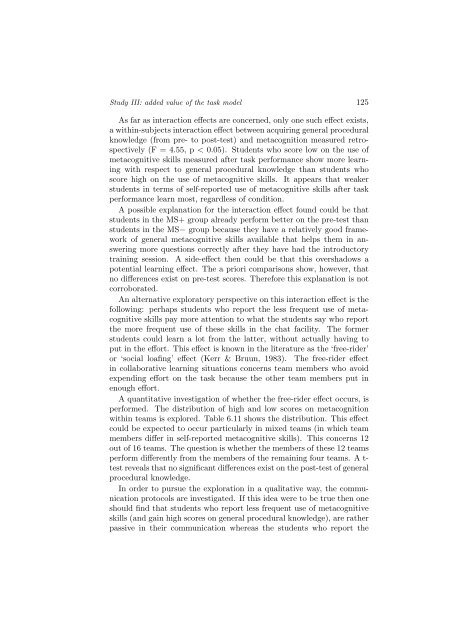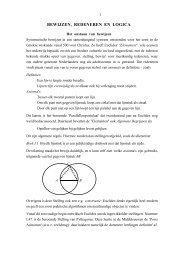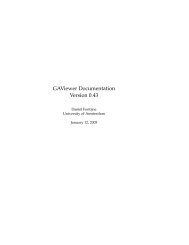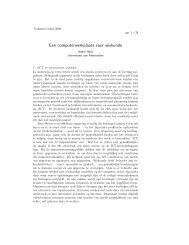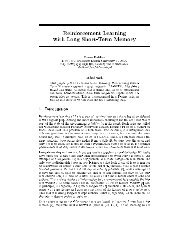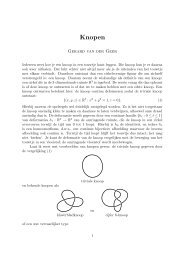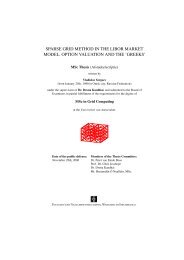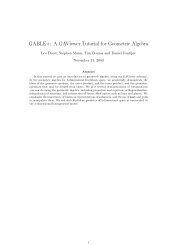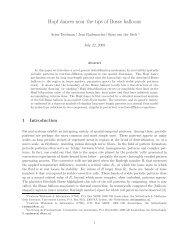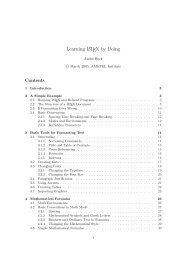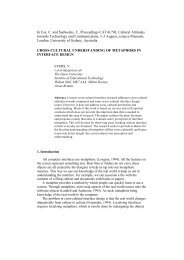The role of metacognitive skills in learning to solve problems
The role of metacognitive skills in learning to solve problems
The role of metacognitive skills in learning to solve problems
You also want an ePaper? Increase the reach of your titles
YUMPU automatically turns print PDFs into web optimized ePapers that Google loves.
Study III: added value <strong>of</strong> the task model 125<br />
As far as <strong>in</strong>teraction effects are concerned, only one such effect exists,<br />
a with<strong>in</strong>-subjects <strong>in</strong>teraction effect between acquir<strong>in</strong>g general procedural<br />
knowledge (from pre- <strong>to</strong> post-test) and metacognition measured retrospectively<br />
(F = 4.55, p < 0.05). Students who score low on the use <strong>of</strong><br />
<strong>metacognitive</strong> <strong>skills</strong> measured after task performance show more learn<strong>in</strong>g<br />
with respect <strong>to</strong> general procedural knowledge than students who<br />
score high on the use <strong>of</strong> <strong>metacognitive</strong> <strong>skills</strong>. It appears that weaker<br />
students <strong>in</strong> terms <strong>of</strong> self-reported use <strong>of</strong> <strong>metacognitive</strong> <strong>skills</strong> after task<br />
performance learn most, regardless <strong>of</strong> condition.<br />
A possible explanation for the <strong>in</strong>teraction effect found could be that<br />
students <strong>in</strong> the MS+ group already perform better on the pre-test than<br />
students <strong>in</strong> the MS− group because they have a relatively good framework<br />
<strong>of</strong> general <strong>metacognitive</strong> <strong>skills</strong> available that helps them <strong>in</strong> answer<strong>in</strong>g<br />
more questions correctly after they have had the <strong>in</strong>troduc<strong>to</strong>ry<br />
tra<strong>in</strong><strong>in</strong>g session. A side-effect then could be that this overshadows a<br />
potential learn<strong>in</strong>g effect. <strong>The</strong> a priori comparisons show, however, that<br />
no differences exist on pre-test scores. <strong>The</strong>refore this explanation is not<br />
corroborated.<br />
An alternative explora<strong>to</strong>ry perspective on this <strong>in</strong>teraction effect is the<br />
follow<strong>in</strong>g: perhaps students who report the less frequent use <strong>of</strong> <strong>metacognitive</strong><br />
<strong>skills</strong> pay more attention <strong>to</strong> what the students say who report<br />
the more frequent use <strong>of</strong> these <strong>skills</strong> <strong>in</strong> the chat facility. <strong>The</strong> former<br />
students could learn a lot from the latter, without actually hav<strong>in</strong>g <strong>to</strong><br />
put <strong>in</strong> the effort. This effect is known <strong>in</strong> the literature as the ‘free-rider’<br />
or ‘social loaf<strong>in</strong>g’ effect (Kerr & Bruun, 1983). <strong>The</strong> free-rider effect<br />
<strong>in</strong> collaborative learn<strong>in</strong>g situations concerns team members who avoid<br />
expend<strong>in</strong>g effort on the task because the other team members put <strong>in</strong><br />
enough effort.<br />
A quantitative <strong>in</strong>vestigation <strong>of</strong> whether the free-rider effect occurs, is<br />
performed. <strong>The</strong> distribution <strong>of</strong> high and low scores on metacognition<br />
with<strong>in</strong> teams is explored. Table 6.11 shows the distribution. This effect<br />
could be expected <strong>to</strong> occur particularly <strong>in</strong> mixed teams (<strong>in</strong> which team<br />
members differ <strong>in</strong> self-reported <strong>metacognitive</strong> <strong>skills</strong>). This concerns 12<br />
out <strong>of</strong> 16 teams. <strong>The</strong> question is whether the members <strong>of</strong> these 12 teams<br />
perform differently from the members <strong>of</strong> the rema<strong>in</strong><strong>in</strong>g four teams. A t-<br />
test reveals that no significant differences exist on the post-test <strong>of</strong> general<br />
procedural knowledge.<br />
In order <strong>to</strong> pursue the exploration <strong>in</strong> a qualitative way, the communication<br />
pro<strong>to</strong>cols are <strong>in</strong>vestigated. If this idea were <strong>to</strong> be true then one<br />
should f<strong>in</strong>d that students who report less frequent use <strong>of</strong> <strong>metacognitive</strong><br />
<strong>skills</strong> (and ga<strong>in</strong> high scores on general procedural knowledge), are rather<br />
passive <strong>in</strong> their communication whereas the students who report the


